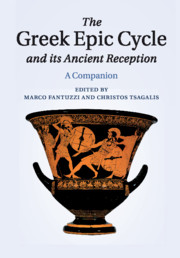Book contents
- Frontmatter
- Contents
- List of illustrations
- List of contributors
- Editorial note
- Introduction: Kyklos, the Epic Cycle and Cyclic poetry
- PART I APPROACHES TO THE EPIC CYCLE
- 1 Coming adrift: The limits of reconstruction of the cyclic poems
- 2 Oral traditions, written texts, and questions of authorship
- 3 The Epic Cycle and oral tradition
- 4 The formation of the Epic Cycle
- 5 Motif and source research: Neoanalysis, Homer, and Cyclic epic
- 6 Meta-Cyclic epic and Homeric poetry
- 7 Language and meter of the Epic Cycle
- 8 Narrative techniques in the Epic Cycle
- 9 Wit and irony in the Epic Cycle
- 10 The Trojan War in early Greek art
- PART II EPICS
- PART III THE FORTUNE OF THE EPIC CYCLE IN THE ANCIENT WORLD
- Works cited
- Index of principal passages
- Index nominum et rerum
3 - The Epic Cycle and oral tradition
from PART I - APPROACHES TO THE EPIC CYCLE
Published online by Cambridge University Press: 05 August 2015
- Frontmatter
- Contents
- List of illustrations
- List of contributors
- Editorial note
- Introduction: Kyklos, the Epic Cycle and Cyclic poetry
- PART I APPROACHES TO THE EPIC CYCLE
- 1 Coming adrift: The limits of reconstruction of the cyclic poems
- 2 Oral traditions, written texts, and questions of authorship
- 3 The Epic Cycle and oral tradition
- 4 The formation of the Epic Cycle
- 5 Motif and source research: Neoanalysis, Homer, and Cyclic epic
- 6 Meta-Cyclic epic and Homeric poetry
- 7 Language and meter of the Epic Cycle
- 8 Narrative techniques in the Epic Cycle
- 9 Wit and irony in the Epic Cycle
- 10 The Trojan War in early Greek art
- PART II EPICS
- PART III THE FORTUNE OF THE EPIC CYCLE IN THE ANCIENT WORLD
- Works cited
- Index of principal passages
- Index nominum et rerum
Summary
This chapter offers an alternative to textualist models and the assumptions that underlie them by weighing other ways in which epic stories can relate to one another and by querying the very notion of an organized, integral cycle as customarily construed. Briefly stated, we advocate the concept of a ‘constellation’ rather than an anthology, basing our model on the real-life ecology of living, observable oral epic traditions. That is, we interpret the remnants of the ancient Greek Epic Cycle as reflecting a loosely related consortium of flexible narratives rather than a sequenced, textually interactive collection of artifacts. Scholars may of course choose to impose a latter-day order upon the materials at hand, an order based on sequence, influence, and other mainstay textual features, but that does not necessarily mean that those materials were in fact composed (or received) according to such an externally imposed framework.
We contend that the surviving texts – Homer's Iliad and Odyssey and all of the Cycle fragments and summaries – represent possible instances of the epic stories surrounding the Trojan War and related events, instances that at some point took shape as fixed and stable (even if partial) entities, but which once existed as malleable story-patterns that featured and fostered variation within limits. With this kind of pre-textual history behind them, overlap and even contradiction would have been natural and expectable, since the narratives were not reacting primarily to one another but were instead emerging from a multiform tradition. We ballast this proposal about the ancient Greek Epic Cycle by surveying several oral epic traditions from around the world that behave similarly, that is, which operate by generating instances that show primary allegiance to their tradition as a whole rather than to any other single story-performance in particular. Toward the close of the chapter we offer some observations on the joint model of neoanalysis and oral traditional poetics that has been gaining momentum in Cycle scholarship.
- Type
- Chapter
- Information
- The Greek Epic Cycle and its Ancient ReceptionA Companion, pp. 78 - 95Publisher: Cambridge University PressPrint publication year: 2015
- 13
- Cited by



